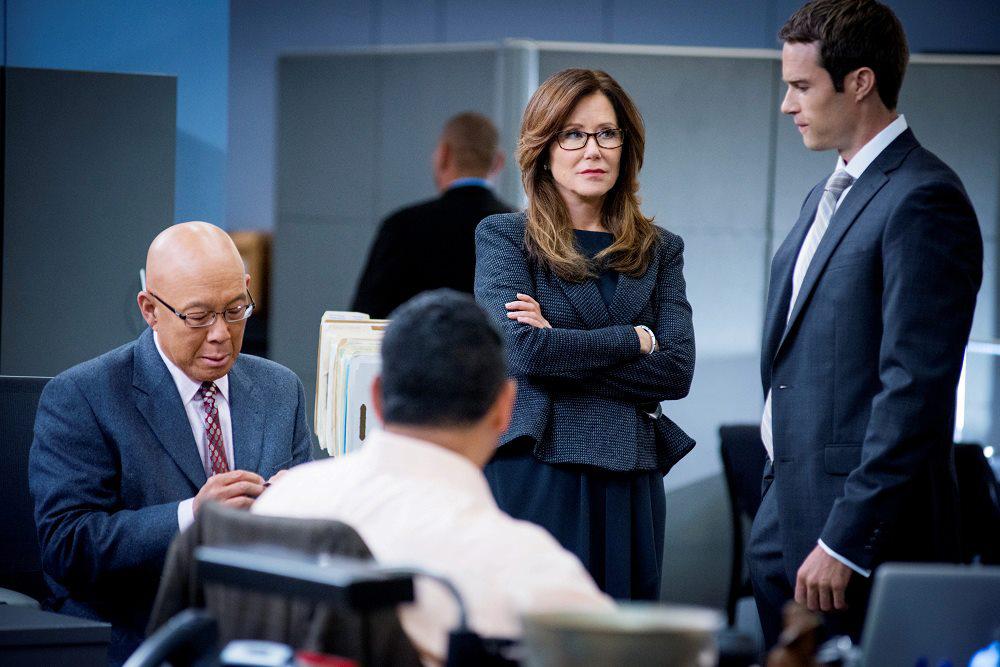When the Kyra Sedgwick police procedural The Closer came to an end in August 2012, most of the show’s characters became part of a new series, Major Crimes. Leading the Major Crimes squad is Capt. Sharon Raydor (Mary McDonnell), who first appeared on The Closer as a meddling investigator from internal affairs.
Just before Major Crimes returns on Monday, Nov. 25, Slate talked with two-time Oscar nominee McDonnell about the challenges of playing an unlikable character, the tough-but-kind roles she’s often cast in, and what her Battlestar Galactica character President Laura Roslin would make of Raydor.
Slate: The transition from The Closer to Major Crimes strikes me as one of television’s smoothest spinoffs and also one of its most substantive—it’s more like a successor. Did you always know that the new show was going to work?
Mary McDonnell: I had a feeling it would, because I understood that [creator James Duff’s] intention was to make the transition through the reality that already existed, as opposed to trying to make some kind of leap into a new show. I felt there would be something very recognizable for people all over the country to attach to. It was no longer, “The Closer to Major Crimes.” It was: “I know these people. I’m in a corporation that just got a new boss. I understand this.” A tremendous number of spinoffs have a self-conscious “new show” aspect to them that can get them in trouble.
Slate: Your character, Sharon Raydor, was introduced in The Closer as an antagonist for Kyra Sedgwick’s Brenda Leigh Johnson. Pretty much everyone resented Raydor’s presence. How did you turn a character whose main characteristic was that she was annoying into someone who the other characters respect and viewers would want to spend time with?
McDonnell: If people were asked or manipulated into having to like Sharon Raydor, it would have flopped. If the viewer and the other characters are experiencing her doing a job as well as she can, and through that she begins to expose other aspects of herself that may shift the way they feel about her, then we’re succeeding. Sharon Raydor had enough strength to overcome the need to try to make people like her. And it was in that resistance that people started to accept her and then grow fond of her, because she wasn’t asking them to change.
Slate: As an actor, are you aware of the likability, or lack thereof, of your character. Is that something that concerns you?
McDonnell: When Sharon Raydor was first on The Closer, I had a double experience. There was a part of me that found it very difficult to be the character that nobody likes. But then I would have so much fun with it in the world, I remember one time I was getting off the New York State freeway, and the lady in the tollbooth recognized me and went ballistic. She said: “Girl, I hate you! I’m so glad you’re on that show; you are so much fun!” And that was the kind of energy I was getting from people. They were loving being annoyed with her. That was a very fun dynamic. It was almost hard to lose that.
Slate: The Closer and Major Crimes share a universe and several characters. Sometimes it’s almost as if the ghost of Brenda Leigh Johnson is still hovering over the place. Are you aware of having to make a stark contrast between Sharon Raydor and Brenda Leigh Johnson?
McDonnell: I’m not aware of that at all. It was so built in from the beginning—that these were very different women, with very different talents, with very different skill sets. The thing that has been really wonderful for me, Mary-slash-Sharon, is that there have been moments in my imaginary world when I’m playing a scene, I go into Sharon Raydor’s office, and her impulse is, God, I would love to call Brenda Leigh and talk this through with her.
Slate: I thought you were going to say, “I would like to eat a Ding Dong.”
McDonnell: Oh, no. Sharon’s not into Ding Dongs.
Slate: One of the aspects of Major Crimes that I really enjoy is Raydor’s relationship with Rusty, a kid who has had a hard life. He was a teenage hustler and a witness to a serious crime. Raydor’s interactions with him really bring out a mood that is often present in the parts you play, a hard-on-the-outside, soft-on-the-inside quality.
McDonnell: Yes.
Slate: Is that the kind of mood that you’re conscious of trying to project?
McDonnell: I think it’s something people see in me and hire me for. I think we all carry something, and sometimes it is for whatever reason needed in the marketplace of entertainment. And then the job is not to try and make it different for the sake of being different but to try and find what is very specifically unique about the character through which these qualities are being manifest. Sharon Raydor has got things going for her that I’ve never played before—and yet she has a core energy that I understand well.
Slate: Another part you are very well known for is as President Laura Roslin on Battlestar Galactica. If Sharon Raydor and Laura Roslin met in some alternative dimension, do you think they’d get along?
McDonnell: I don’t really know Laura Roslin outside the end of her life, which was on the battlestar. I only know a little bit about her past. I think I know more about Sharon Raydor’s personal life than I ever really knew about Laura’s. So would they meet and get along? I really don’t know yet.
This interview has been condensed and edited.
